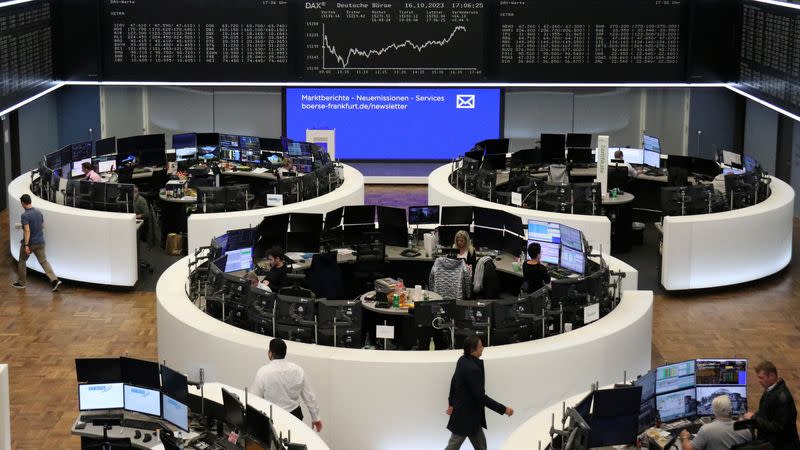US stocks end sharply lower, crude jumps on Middle East tensions
By Stephen Culp
NEW YORK (Reuters) - Wall Street stocks tumbled and crude prices surged on Wednesday as escalating Middle East turmoil prompted a broad sell-off and stoked oil supply concerns.
All three major U.S. stock indexes shed 1% or more, closing near session lows. Momentum stocks, led by Nvidia, Tesla Inc and Amazon.com, pulled the tech-heavy Nasdaq down 1.6%.
U.S. President Joe Biden arrived in Israel after an attack on a hospital in the Gaza Strip derailed plans for a diplomatic summit with Arab leaders as the Israel-Hamas conflict continued unabated.
Adding to headwinds, Nvidia revealed details regarding the extent to which U.S. restrictions on chip exports to China could potentially affect its sales.
"The lack of certainty around the potential for escalation in the Middle East has a direct relationship with oil, which has downstream implications and could impact earnings," said Greg Bassuk, chief executive at AXS Investments in New York.
"Investors have moved to a risk-off mentality on the combination of the war in Israel, uncertainty around chips and earnings, and Fed policy all taken together," Bassuk added. "These themes will be the investor narrative for the upcoming days, resulting in this see-saw market of ups and downs."
A string of quarterly profit beats, specifically from Morgan Stanley and Procter & Gamble, along with a sharp rebound in U.S. housing starts, failed to stir much upside sentiment.
Elsewhere, Beijing reported that China's GDP grew at a faster-than-expected pace in the third quarter, suggesting the recovery of the world's second-largest economy is gaining traction.
The Dow Jones Industrial Average fell 332.57 points, or 0.98%, to 33,665.08, the S&P 500 lost 58.6 points, or 1.34%, at 4,314.6 and the Nasdaq Composite dropped 219.45 points, or 1.62%, to 13,314.30.
European stocks slid, ending down 1.1% due to deepening fears over the Middle East conflict and as a downbeat forecast for the semiconductor sector weighed on sentiment.
The pan-European STOXX 600 index lost 1.05%, and MSCI's gauge of stocks across the globe shed 1.26%.
Emerging market stocks lost 0.95%. MSCI's broadest index of Asia-Pacific shares outside Japan closed 0.66% lower, while Japan's Nikkei rose 0.01%.
Oil prices advanced as the mounting strife in the Middle East appeared to pose a growing threat to supply.
U.S. crude rose 1.92% to settle at $88.32 per barrel, while Brent settled at $91.50 per barrel, up 1.78% on the day.
U.S. benchmark Treasury yields touched more than 16-year highs, continuing their uphill climb after a sharp rebound in U.S. homebuilding pointed to economic resiliency.
Benchmark 10-year notes last fell 15/32 in price to yield 4.9106%, from 4.847% late on Tuesday.
The 30-year bond last fell 17/32 in price to yield 4.9892%, from 4.951% late on Tuesday.
The greenback advanced against a basket of world currencies as market participants kept a watchful eye on developments in the Middle East.
The dollar index rose 0.31%, with the euro down 0.41% to $1.0532.
The Japanese yen weakened 0.04% versus the greenback at 149.91 per dollar, while Sterling was last trading at $1.214, down 0.31% on the day.
Gold jumped to a more than two-month peak as demand for the safe-haven metal was boosted by the uncertainties surrounding the Israel-Hamas conflict.
Spot gold added 1.3% to $1,948.42 an ounce.
(Reporting by Stephen Culp; Additional reporting by Amanda Cooper in London; Editing by Christina Fincher, Leslie Adler and Richard Chang)



